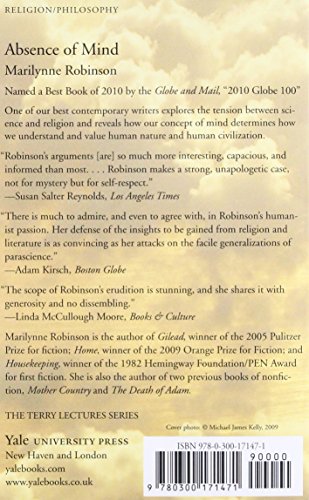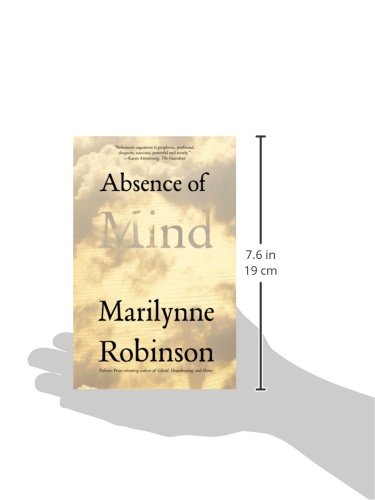



Absence of Mind: The Dispelling of Inwardness from the Modern Myth of the Self (The Terry Lectures Series)
E**.
Great book
Everything arrived on time and as advertised
J**N
Attacking scientism instead of Darwinism?
Although this book begins with a challenge to the 'postmodern atheists' who use science to debunk religion, it soon turns into an historical critique of positivism. And this aspect of the book is of great value, save only that the author adopts a tactic of indirection to do this: an older generation of critics of Darwinism often attacked sociobiology, or evolutionary psychology, leaving the core theory of Darwin intact. The same strategy seems to be at work here. We are treated to an interesting expose of scientism, but then one prinicple culprit is left intact. This novel perspective built around the idea of parascience breaks new ground, but is in the end misleading.This spoils the argument, and the important discussion of altruism is left stranded as an example of postivistic parascience. But the point here is not just that positivism deprives the discussion of a 'self' but that Darwinian evolution cannot on the basis of the theory of natural selection account for altruism at all. The very arcane argument of Hamilton on kin selection (next to the parallel tradition of group selection) is a tour de force, but the simple and devastating answer is, so what? The foundation for the argument is a fallacy, and cannot distinguish the spectrum of ethical conditions of which altruism is but a particular aspect. The obsession with altruism as the core 'ethic' to be explained by explaining it away is a curious symptom of Darwinism pathology as a kind of dumbed down economic ideology in disguise, attempting to legitimate the 'selfishness' proposed by Adam Smith as economically dynamic. This ideological corruption is what seems to lie behind the whole focus on altruism by scientists determined to degrade its meaning. Here Robinson's challenge on the grounds of parascience is absolutely cogent, yet fails to go the whole mile and reject the sophistical junk science of mathematicized selectionism made into a tricky-dick theory of unselfish behavior. Bascially the game is that selfishness is made to explain unselfishness, in the vein of scientific nihilism.Thus Robinson's stance is unclear here. To challenge Darwin directly is a fast way to not sell a book, so the suspicion is the strategy is the one of indirection to forestall the fate of Darwin critics.That is a reminder that bestsellers are almost certainly not going to challenge Darwin, that we must turn to the underground (not ID) literature on evolution/scientism to get real answers.Despite the great interest of this analysis, we need to be done with Darwinism at this point: it needs to be exposed directly. And that expose would be a prime instance of Robinson's argument.Interesting book in any case, but be suspicious that authors, and I am not yet including Robinson, will fib on Darwinian issues for monetary gain.Speaking generally, Robinson is quite correct to show the way that modern science cannot handle a 'self'. The point should be considered in the light of Kant. Her last chapter on Freud is cogent here also, although Freud is the much debunked themetic of a past generation now. It is however worth considering the roots of Freud in fin de siecle distortions of Schopenhauer, leading us back to Kant, once again.The philosopher Kant exposed the whole game of 'Newtonism' now the positivism in Robinson's discussion, and provides the classic answer in his transcendental idealism, which is more in tune with science than the religious traditionalism that seems to lurk behind the book's challenge to science.The solution to the problem was produced in the Enlightenment, and not so very well by defenders of religion who tend to make scientists double down in their 'parascience'.
I**Š
She's a Soul Woman
Why do I get the feeling that, despite her calm exterior, Marilynne Robinson positively revels in her role as the one who would constantly - to misquote the Apostle Luke as rendered in the King's English - "kick against the pricks." (Acts 9:5)What a great soul, great heart, and great mind this woman is. Frankly, it feels a little odd to be critiquing her in an Amazon review, yet here we are. Briefly, in these lectures, Mrs. Robinson takes on what she views as contemporary disregard for the soul, the felt life, the antiquities, and their importance to a balanced view of culture and history. In other words, she states a good case on behalf of just about anything that a quasi-empirical, western academia is attempting to marginalize, or failing that, simply choosing to ignore in order to justify the prescriptive, and often narrowly defined subtexts of "objectivity" and "skepticism" under which it labors. So that was a horrible sentence.In other words, why can I not shake the feeling that it was only after hearing this lecture from Mrs. Robinson that Richard Dawkins stopped calling himself an atheist? Simply put: she addresses the odd, and mostly recent, inclination of academicians in the hard sciences to wander outside their areas of specialization to speculate on matters that don't fit their expertise. Biologists, resolute in their dedication to what is measurable, suddenly commenting on God. Linguists who chime in on 'delusional' people of faith, though the linguists don't seem to know anything about the context, culture, or the texts from which that faith is drawn. Physicists frustrated over whether they'll ever finally be able to falsify a hypothesis dealing with dark matter or whether they'll just have to content themselves with telling people, sans irony, 'You can't see it, and we can't show it to you, but it's there. Read these canonical, mathematical formulas and Believe!' My example, not Marilynne's: He's a brilliant physicist, but when he opens his yap to wax metaphysical, Larry Krauss is a dilettante. And a poorly-read one to boot.Ranging from a practical commentary on cosmology drawn from to-the-moment quantum studies to scathing critiques of the too-frequent absence of intellectual rigor in the work of (insert the name of your favorite post-enlightenment multi-disciplinary intellectual superstar here), Marilynne's is a hard lesson writ large: the bulk of modernist/rationalist (Darwin, Marx, Freud, Nietzsche, Skinner) formulations are profoundly irreconcilable with one another, EXCEPT in their joined disdain of things spiritual. A conclusion that, as Marilynne illustrates, "clearly exists in anticipation of its various justifications".Pro-hoc thinking from professional scientists. Go figure. And you thought the silliness which is logical positivism was long ago molderin' in the grave.Before you accuse her of being 'anti-scientific', put down your epithet of choice and step away from your insistence on the observable, and look at Marilynne Robinson as just another person looking for answers in a complex world. A world filled with all kinds of things we can see and measure and figure out, and likely, all kinds of things we can't.A brilliant, decent, and elegant thinker. With a mind and a soul.
G**N
Five Stars
wonderful book
E**A
Four Stars
Good quality bit hard going but worth a try
H**N
I enjoyed it a lot and loved the clarity of thought ...
It is a challenging book - philosophical and broad in scope. I enjoyed it a lot and loved the clarity of thought in regard to the reasoning that is often seen as being so "modern" and convincing but is in fact often circular.
A**N
And you have to admire a writer who can make you like John Calvin
A lyrical plea for a change to the intellectual establishment. And you have to admire a writer who can make you like John Calvin.
A**E
didn't come up to what i'd hoped.
not my cup of tea, found it dull to be honest.
Trustpilot
2 weeks ago
2 months ago